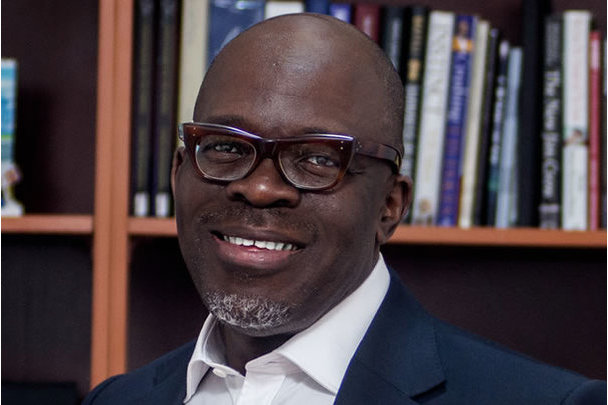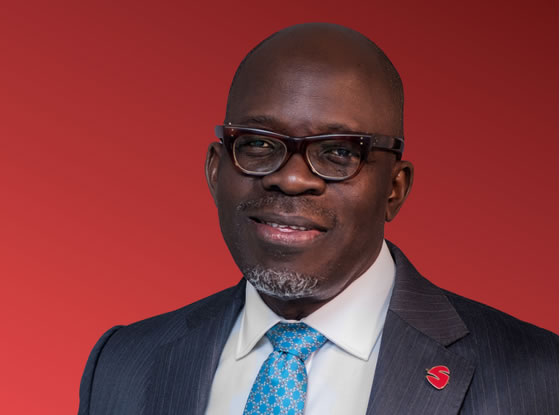Several small businesses I advised 20 years ago are big names now

Summary
Amongst other ground-breaking deals, Olabinjo led the team that structured the take off funding for Main One Cables, the first privately-owned underwater cable landing in Nigeria.
Ola Olabinjo, CEO, Skystone Capital and Investment Limited, speaks about the resilience of the Nigerian financial services sector, his career, the values delivered to clients by his firm, and his outlook on the economy, in an interview with Jide Akintunde, Managing Editor, Financial Nigeria, in the Eminent Business Personality Series (EBPS) of the publication.
Jide Akintunde (JA): Since the reform of the Nigerian banking industry in the mid-2000s, the industry and the broader financial services sector has weathered several economic crises, often caused by external shocks, and by the Covid-19 pandemic of two to three years ago. What factors have been responsible for this general resilience of the sector?
Ola Olabinjo (OO): Indeed, the Nigerian banking industry has weathered a number of storms since the mid-2000s, ranging from the global financial crisis of 2007-2008 and more recently the COVID-19 pandemic. The global financial crisis almost brought the world economy to a standstill and the Nigerian economy, including its financial services industry, was not exempted. The industry’s exposure to the capital market and downstream oil and gas sector made it suffer huge losses. All thanks to the Central Bank of Nigeria (CBN) for its prompt response in rescuing eight banks through capital and liquidity injection, restoring confidence and sanity into the banking industry. The banking industry also showed some level of resilience during the COVID-19 pandemic and the oil price shock in 2020. The industry maintained its growth rate (FY’20: 13.34%), outperforming the overall economy (FY’20: -1.92%).
Some of the factors that made the banking industry resilient during these periods of economic challenges include CBN’s prompt intervention; strong capital buffers; robust macro-prudential regulatory framework that helped to bolster financial stability and mitigate systemic risk; diversification of revenue streams and risks; and strict enforcement of corporate governance principles also supported the industry’s resilience. Of course, increased investment in technological infrastructure helped banks during the COVID-19 pandemic, by providing customers access to digital payment platforms, thus reducing physical presence in banking halls.
JA: Your career as a senior banker was during this period. What were the major experiences you had in the industry that cannot elude your reflection?
OO: I retired from banking following my stint as Executive Director with oversight for Corporate Bank, Lagos and Southwest and at some other period, Abuja, and the North. My career has been quite eventful, seeing that I have practically worked across critical functions in banking – internal control, branch operations, funds treasury, commercial banking, etc. Over the cause of my career, I have led teams to advise, structure and arrange debt financing for major infrastructural projects in the Oil and gas, Power, FMCGs, and Telecom Sectors. Notable amongst these include financing arrangement and structuring of a US$50 million gas conversion plant project, which was the first carbon credit qualifying project in Nigeria. I also provided debt solutions to a lot of Nigerian companies during the Shell IOC Investment Program. I also led the team that structured the take off funding for Main One Cables, which was the first privately owned underwater cable landing in Nigeria. While at Skye Bank, I led to structure the first reserve-based lending for indigenous marginal fields in Nigeria, thereby enabling companies like Waltersmith and Pillar Oil to re-enter fields and commence crude oil production. At that time, most big banks did not want to go near upstream crude oil production. There were several small businesses I advised and supported over the last 20 years that are big names now.
Currently, I serve on Boards as Non-Executive Director, where I contribute actively to the growth and development of the companies. I am currently the Chief Executive of one of the fastest-growing finance houses in the financial services industry in Nigeria today. These are progressional accomplishments; but for me, the accomplishment I like to reckon with is when I see mid-sized businesses that we have supported, both in terms of our advisory or funding intervention, become leaders in their industries.
As an example, I remain proud of our intervention with a cable manufacturing company where we helped reorganise governance structures and worked with the management to put in place and implement structures and processes needed to assess funding from the debt capital markets. These interventions quickly allowed the company to attain an enviable position in its sector by ramping up capacity very quickly to become the largest cable manufacturer in West Africa and the biggest fibre optic manufacturer in sub-Saharan Africa. Those are the milestones that give me joy.
JA: Risks are once again elevated in the industry given the policies that have been recently introduced, which many commentators have canvassed for years. But the scale of the impact of the policies – even if they may be short termed – has troubled many people. How do you expect the banks (both commercial and investment banks) to navigate the current policy headwinds?
OO: There is no doubt that recent policy reforms are having short-term economic pains for individuals and businesses. Navigating the current policy headwinds requires an initiative-taking and strategic approach from both commercial and investment banks. Given my experience in the financial industry, I believe that banks should closely monitor policy changes, assess potential risks, and adapt their strategies accordingly.
It is important that banks hedge against risks, especially exchange rate risks. From the recently released H1’23 corporate results, over N700 billion has been reported as FX losses, making hedging of exchange rate risk paramount in a volatile forex market. It is also expedient for banks to strengthen their credit assessment capacity. As more individuals and businesses struggle, there is a risk of higher debt default, which will push up non-performing loans. Additionally, maintaining a diversified portfolio and exploring emerging opportunities would help banks mitigate the impacts of the policies and position themselves for long-term success.
JA: It is in the current context that Skystone Capital and Investment Limited is celebrating its 5th year anniversary. How well has the institution performed?
OO: We started Skystone to fill the gap between SMEs and commercial banking. We realised most banks were not able to guide many businesses to grow to the capacity required to allow them create jobs and foster economic activities. We set up Skystone to identify and intervene in small and medium scale Nigerian businesses that have the potential to grow and I can tell you that five years of setting up the company, we have taken companies to the debt capital market, we have cleaned up and supported companies, and we are currently advising one of the largest cocoa exporters in Nigeria. We are advising, restructuring, and supporting the largest rubber exporters and processing plants in Nigeria amongst many others.
The good thing is that we are taking a lot of these businesses away from regular commercial banks without them even knowing. As we expand, we are bringing in more fresh hands into Skystone and training them to be fit for purpose. We also continue to maintain a good and fantastic working relationship with our regulators, the CBN, as they provide guidance, and in few circumstances exceptions in the way we operate and that has made us better. We have also been able to attract a lot of investments and funding from our partners.
JA: What are the specific values that Skystone Capital is most proud of introducing or deepening in the financial services sector?
OO: Skystone Capital takes pride in introducing a client-centric and advisory-focused approach to the financial services sector. We prioritise understanding of the unique needs and potentials of our clients, particularly SMEs, and offer them tailored financial advisory services to help them achieve their goals. Our commitment to fostering efficiency and attractiveness in businesses through restructuring sets us apart from our competitors. We aim to be the preferred SMEs supporter in Nigeria, providing excellent service and driving their growth.
JA: I am quite acquainted with your leadership, knowing many younger bankers you mentored and are now in senior positions in the industry. How have you combined getting the deals done and, at the same time, helping your colleagues to develop their own careers?
OO: I tell everyone, mostly those just starting their career, that social capital is as important as intelligence. While within the industry, we tend to spend a lot of time trying to ensure that we are making as much impact as possible and for you to stand out you must be exceptional. However, I do not fail to recognise the importance of training the younger workforce in how to navigate within this industry as there would be a time when they would be saddled with the responsibility of overseeing similar duties. To ensure that I impact this younger generation, I get involved in their professional life as their personal and educational well-being as these will have an impact on their productivity. Some of the younger workforces I worked with in previous years are now leaders in leading financial institutions and can discharge their duties efficiently and this gives me boundless joy and pleasure.
JA: What is your outlook for Skystone Capital over the next five years?
OO: On a corporate development standpoint, we hope to further consolidate our early gains around deepening and improving our governance and management practices, launch a talent development and retention programme, improve our technology spend to bring about scale, and explore value accretive partnerships that will allow us to move closer to our mid-term objectives. From our core mandate – financial intermediation – standpoint, we hope to launch products that are ESG compliant in line with global developments. We believe that, over the medium-term horizon (2027), green-related assets should constitute up to 25 percent of our loan book. We also hope that our relationships with the domestic development finance institutions will be deepened, which will enable opportunities to jointly deliver on our mandates.
JA: Do you think the Nigerian economy – or even the political economy – will have a soft landing after the current storm caused by the fuel subsidy removal and new exchange rate policy. Why?
OO: Yes. I believe there would be a significant improvement not only in the Nigerian economy but also in other areas of the country. Although this time may be difficult, especially because of the inconveniences experienced due to the policy changes, I believe the long-run benefits are enormous if the new policies are complemented with institutional reforms. This is because Nigeria will be a viable ground for investments especially foreign direct investment, which has the potential to boost growth and increase employment levels. I also believe that with prudent fiscal management, collaboration between the government and private sector, and a focus on economic diversification, Nigeria can navigate these storms.
Recent Interviews
Latest Blogs
- The Museum of West African Art saga
- The complexity and complication of Nigeria’s insecurity
- Between bold is wise and wise is bold
- Prospects of port community system in Nigeria’s maritime sector
- Constitutionalism must anchor discipline in Nigerian Armed Forces
Latest News
- Africa needs €240 billion in factoring volumes for SME-led transformation
- ChatGPT is now the most-downloaded app – report
- Global trade to hit record $35 trillion despite slowing momentum
- CBN licences 82 bureaux de change under revised guidelines
- Green economy to surpass $7 trillion in annual value by 2030 – WEF











